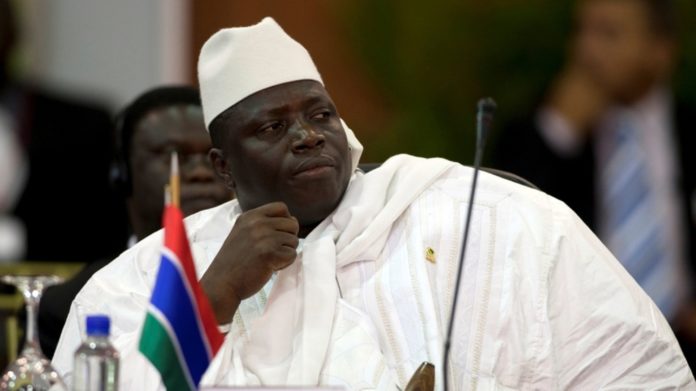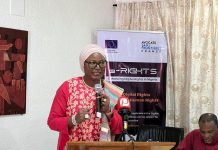The Truth, Reconciliation and Reparations Commission (TRRC), in its Investigative Report submitted to Government, outlined that Sexual and Gender Based Violence (SGBV) was allegedly committed throughout Yahya Jammeh’s regime.
According to the Commission, former President Yahya Jammeh and other senior government officials (including senior security officials and government ministers) subjected women and girls to a range of sexual violence including rape, sexual assault, sexual harassment and sexual exploitation, with impunity.
See below the reproduction of the Commission Report, Government Position as stated in the ‘White Paper’ on one of the most pathetic topics investigated by the Commission alleging how women rights were violated by agents of the state.
Theme 11: Sexual and Gender Based Violence
Background:
- Widespread sexual and gender-based violence (SGBV) characterized Yahya Jammeh’s twenty-two (22)-year rule as President of The Gambia. Sexual violence was often perpetrated either as the main objective of certain human rights violations or it was used as an instrument of repression, torture and punishment. Across The Gambia, women were disproportionately affected by violations including sexual violence, other forms of torture, cruel, inhumane and degrading treatment, arbitrary arrests, detention and forced labour.
- Among the incidents examined by the Commission include
(i) the sexual violence and abuse of participants of scholarship pageants and “protocol girls”;
(ii) rape and sexualized torture by state security officials of male and female detainees; (iii) violations committed as part of the of the witch hunt exercises and
(iv) sexual violence during “the Presidential Alternative Treatment Program” (PATP). These violations were perpetrated mainly by security agents and former government officials. The Commission received credible evidence that Yahya Jammeh himself committed some of the most egregious violations against women and girls through a “sophisticated system” using state institutions and resources.
- Worldwide, under reporting of sexual violence remains a phenomenon, but the shroud of secrecy surrounding sexual violence in The Gambia at this time was exacerbated by fear of the Jammeh regime’s brutal suppression of dissent and impunity for violators. As Professor Abdoulaye Saine testified, “fear and a so-called “culture of silence” enveloped the entire country and ordinary citizens were not spared Jammeh’s wrath”. Impunity was the order of the day, particularly for sexual and gender-based violence, during the Jammeh regime.
- The Commission heard testimony after testimony about the impact of these crimes – about the trauma, shame and misery that scores of women and girls have had to live with for so many years. Through its work, the experiences of
Gambian women and the abuse that they were subjected to have been made visible and must continue to remain so until perpetrators are held to account.
- The Commission found that SGBV was committed throughout the mandated period under review. Violations included rape, sexual exploitation, sexual assault, and sexual harassment. The Commission also found that sexual violence also accompanied other violations. Sexual violence was used to repress, punish, intimidate, humiliate and ill-treat men and women who were opposed to or perceived as being opposed to Yahya Jammeh or his Alliance for Patriotic Reorientation and Construction (APRC) party. Members and perceived supporters of the United Democratic Party (UDP) and their family members were frequently targeted for arrest, detention and sexual violence. The Commission received evidence that at least one victim who rejected Yahya Jammeh’s sexual advances and proposals for marriage was raped. The Commission found that sexualized violations, forced nudity and rape were adopted as organisational policy of the former regime.
- The Commission found that former President Yahya Jammeh and other senior government officials (including senior security officials and government ministers) subjected women and girls to a range of sexual violence including rape, sexual assault, sexual harassment and sexual exploitation, with impunity. These powerful men took advantage of their positions of authority, the vulnerability of the women and girls and the climate of fear that they themselves created to commit these violations. Sexual violence was committed in various places including in private homes and in public locations including at the State House of the Republic of The Gambia, the Residence of Yahya Jammeh in Kanilai, Yahya Jammeh’s farms in Kanilai, at the premises of the National Intelligence Agency (NIA) Headquarters, at Mile II Prison and at the Fajara Army Barracks.
- The Commission’s findings revealed that men, women and girls were victims of SGBV. Men were victims most often in detention settings and during interrogations. The Commission also found that victims ranged from all age groups, including children, older women and men. There was an organisational
policy at the NIA to strip male or female detainees naked especially in cases where detainees were arrested for their perceived opposition to Yahya Jammeh.
- Women and girls faced systemic discrimination in public and private spheres despite reforms to policies, applicable laws, enactments of women-centric legislations and ratification of key international instruments during the mandated period. The Commission found that through the application of customary laws and patriarchal norms, women faced discrimination when it came to their right to own land, inheritance rights and their status in judicial processes. Victims most often did not report the violations due to fear of reprisal, having nowhere to report since the perpetrators were from the security agencies and sometimes highest- ranking State Officials. These victims also did not have access to medical care or psychological support.
- The culture of fear that existed under the Jammeh regime and the cultural and social norms in Gambia’s patriarchal society suffocated the rights of women and girls to their detriment and silenced the crimes they were subjected to. Sexual violence was not reported due to the stigma and shame that accompanies disclosure and the pressure to place family honour at the centre and above one’s own suffering. Access to justice was absent in the repressive Jammeh regime for sexual violence committed by the Head of State and senior government officials.
- The information and evidence received by the Commission underscore the reality that The Gambia is particularly afflicted by the widespread lack of knowledge and understanding of SGBV, which means that such violations and crimes are not properly identified, prevented, managed and/or subject to effective accountability. This has led to widespread impunity and horrifying incidents of SGBV against all genders and age groups, particularly girls. Furthermore, the various complaints mechanisms such as police stations, health facilities, social welfare, child protection alliance and various civil society organisations and the legal system are faced with serious challenges ranging from…
To be continued…

















